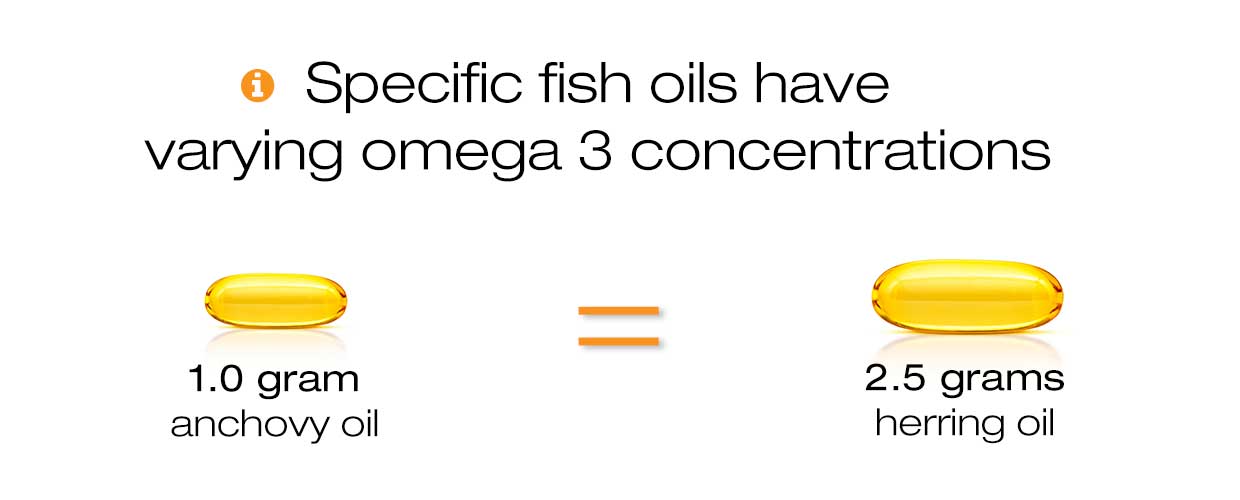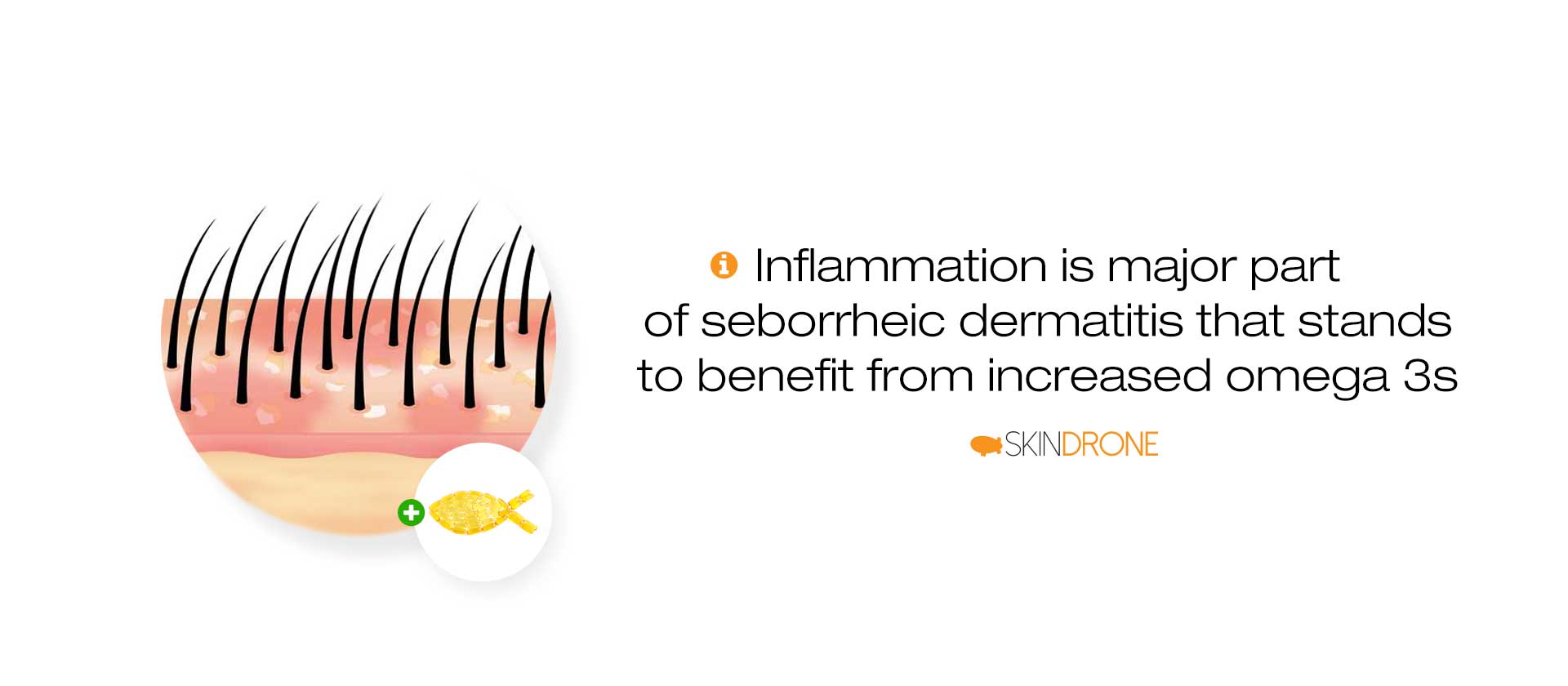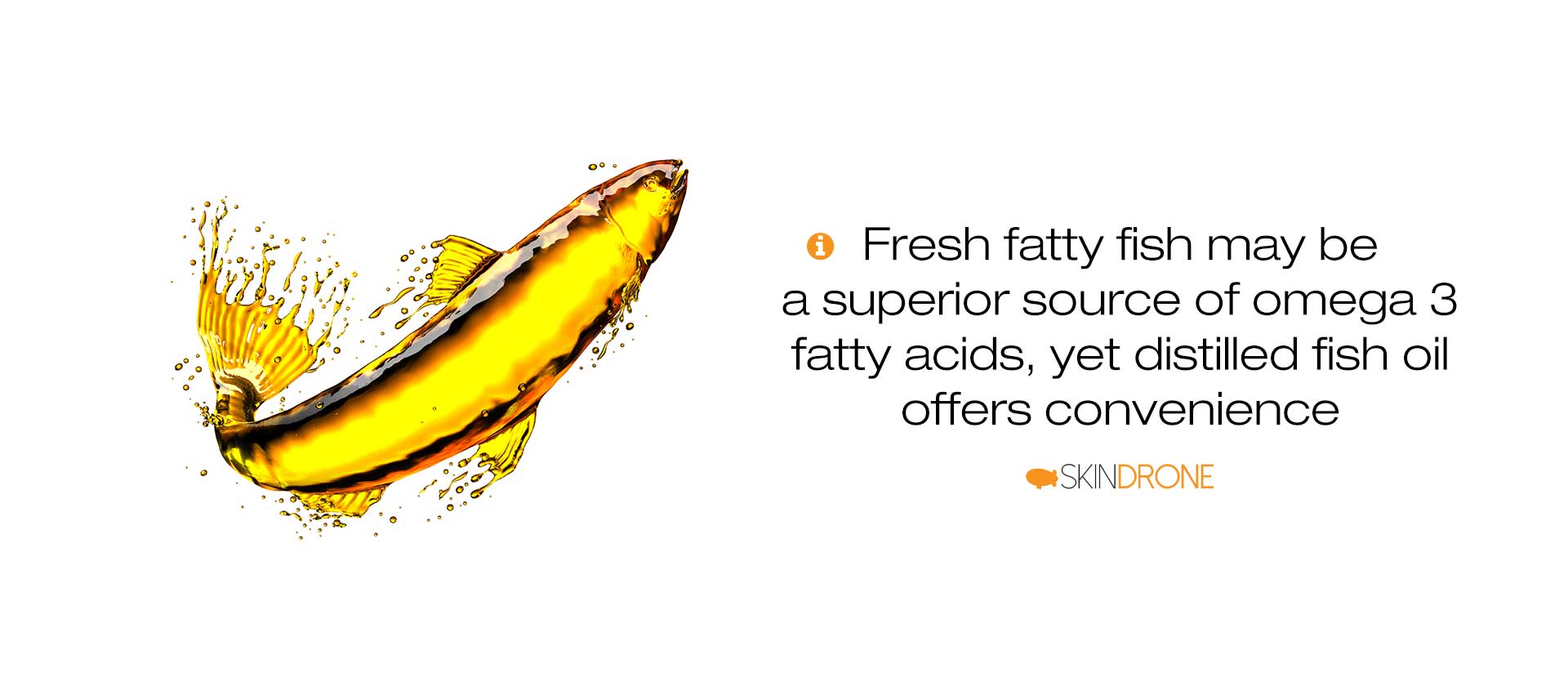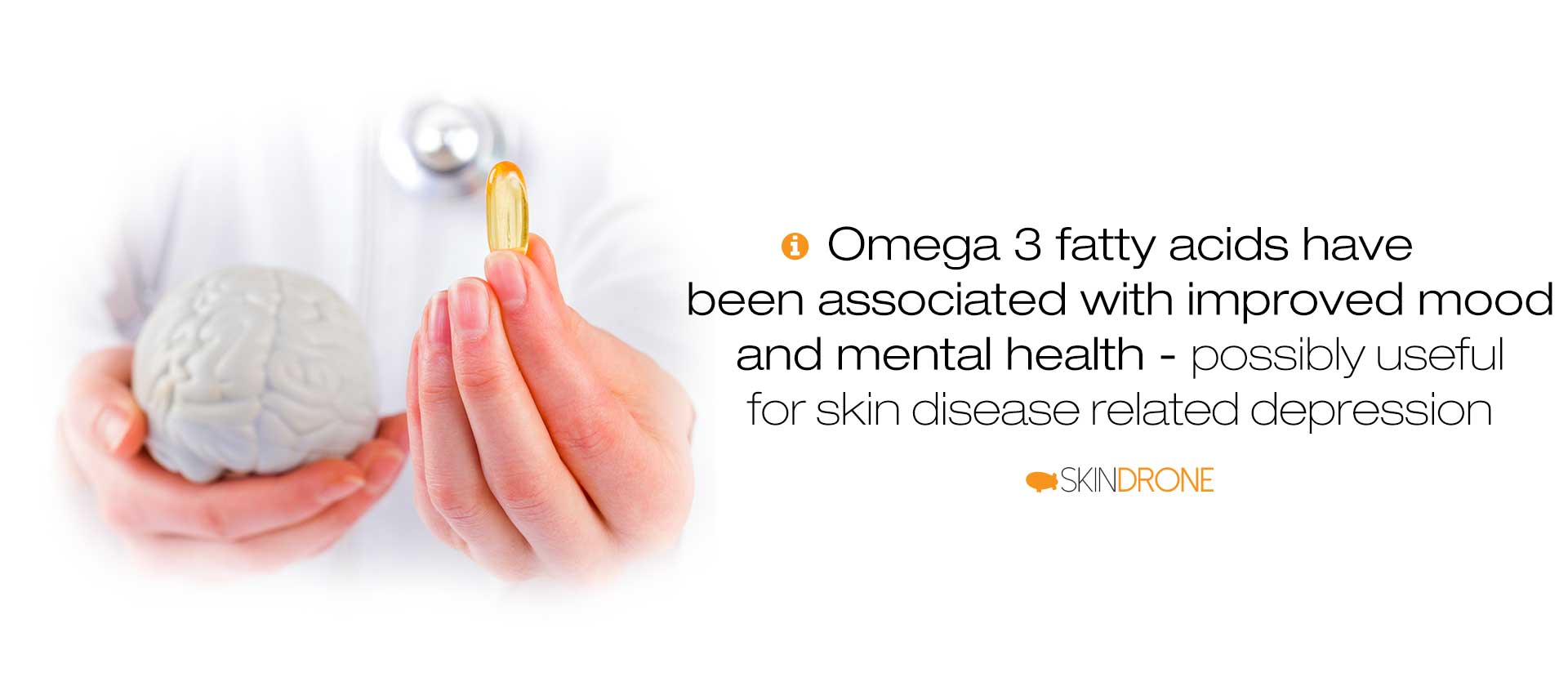Numerous sources suggest fish oil can be used as a complementary treatment for seborrheic dermatitis. This article reviews the evidence for its use and highlights the relevant research findings from related skin conditions.
Literature review takeaway: Despite the lack of conclusive evidence, increasing the consumption of omega 3 sources, such as fish oil, can help combat inflammation and in-turn may help reduce the severity of seborrheic dermatitis symptoms. If utilizing fish oil, the importance of selecting a high-quality product must be emphasized.
What is fish oil
Fish is a rich source of omega 3 fatty acids; specifically DHA and EPA. These fatty acids are what are known as essential fatty acids. Meaning they are required for health, but can not be synthesized by the body. Thus, they need to be obtained from the diet.
Thanks to modern production techniques, you can now either obtain your requirement the good old fashion way by eating whole fish or by taking purified fish oil.
Fish oil typically comes from small fatty fish such as capelin, Norway pout, mackerel, sardines, and anchovies [1]. However, advances in fish farming have also resulted in a rise in fish oil production from large species such as salmon.
Being derived from different varieties of fish, the oil itself can have distinct properties and fatty acids profiles (corresponding to the fish it was derived from). Additionally, differences in the production and quality control processes can impact the final product.
For example, 2.5 grams of herring oil contains roughly the same quantity of omega 3 fatty acids as does 1 gram of anchovy oil [1].

Ideally, quality fish oil should have a high relative omega 3 content, come from a healthy fish source, and be produced in a production process that reduces the amount of oxidation. The worst thing you want is to be taking fish oil capsules that have gone rancid, as this would greatly offset and potential benefits.
One way to ensure you’ve obtained a quality fish oil is by sticking to reputable producers. Another method is to taste the fish oil. If the fish oil is of high quality, it shouldn’t taste overly bitter or acidic.
Benefits of fish oil
The numerous benefits of omega 3 fatty acids are well documented throughout the medical literature. Detailed discussion regarding the effect of omega 3s can be found in the dedicated article on omega 3 fatty acids.
The most established of these benefits relates to omega 3s beneficial impact on inflammation. And this benefit specifically, has noted to aid a variety of health conditions (rheumatoid arthritis, psoriasis, asthma, and inflammatory bowel disorders) [2].
A few of the other specific benefits include:
- Improved cholesterol levels
- Improved insulin sensitivity
- Reduced blood pressure
But if you want to delve further into this topic, please see the article linked above.
Fish oil use in seborrheic dermatitis
When it comes to seborrheic dermatitis, there aren’t any specific studies examining how increasing omega 3s can impact the condition.
Benefits for many related skin conditions
However, there are several studies which have shown increasing omega 3 consumption can benefit a variety of other commonly related skin conditions.
While many of these studies are relatively small in scale and the evidence isn’t conclusive, the consensus seems to be that omega 3 supplementation benefit most inflammation-driven skin conditions.
Atopic dermatitis
- Daily supplementation with fish oil containing 3.7 grams worth of omega 3 fatty acids during pregnancy can reduce the risk of atopic (allergic) conditions in infants [3]
- Daily supplementation with 10 grams of fish oil (containing 3 grams of omega 3 fatty acids) can improve symptoms of atopic dermatitis [4]
- A lipid infusion containing 10ml of fish oil showed a significant beneficial impact on the clinical severity of atopic dermatitis (interestingly, omega 6 showed a more sustained benefit for study participants) [5]
Acne
- In an animal model (mice), fermented fish oil showed a superior ability to suppress skin inflammation [6]
- Daily consumption with fish oil containing roughly 2 grams worth of omega 3 fatty acids showed significant benefit in individuals with moderate to severe acne (small study) [7]
- Daily consumption of fish oil containing 2 grams worth of omega 3 fatty acids over 10 weeks, showed significant improvement in both inflammatory and non-inflammatory acne [8]
Psoriasis
- Daily consumption of 10 fish capsules (containing 1.8 worth of EPA) for 12 weeks lead to an improvement in skin redness, plaque formation, and itch [9]
- Daily consumption of a lipid infusion containing 4.2g worth of omega 3 fatty acids produced a benefit in roughly 40% of study participants after 6 weeks [10]
Proposed benefits for seborrheic
The primary symptoms of seborrheic dermatitis are understood to be the result of a heightened immune response to the by-products of Malassezia yeasts residing on the skin surface.
More specifically, our skin produces sebum for its protection. Malassezia yeast are a natural part of these sebum rich areas and present on the skin of practically all humans. For those of us unfortunate enough, some of the by-products of these yeasts cause an immune response (similar to an allergic response) and create the symptoms we collectively know as seborrheic dermatitis.
And while the above explanation is the most common, there is still much debate and uncertainty that remains, with several alternative/conflicting theories put forward (these are all discussed in the more thorough article reviewing the possible causes of seborrheic dermatitis).
Despite the lack of consensus, one feature common among all explanations is that seborrheic dermatitis is characterized by a heightened inflammatory response.
Since we’ve seen that a general benefit exists for most skin conditions featured run-away inflammation, it’s reasonable to presume fish oil would benefit seborrheic dermatitis. Even if fish oil doesn’t necessarily tackle the issue head-on, there is a good chance that by reducing overall inflammation, the severity of symptoms could be reduced.

Based on this argument, it’s difficult to understand why fish oil hasn’t been evaluated in greater detail for the treatment of seborrheic dermatitis.
The only vague hints we have come from to earlier studies evaluating the blood levels of overall essential fatty acids in affected individuals [11, 12]. And even though clear differences were noted in affected individuals (both adults and in children), there were no follow-up studies to examine the potential benefits of supplementation (in the children study, it was noted that remission of symptoms coinciding with an improvement of essential fatty acid levels).

Additional notes
- Some evidence suggests that fish oil consumption together with rich sources of omega 6 fatty acids can increase inflammation [13]
- Most research from the past several decades has highlighted the importance of maintaining a good ratio of omega 3s to omega 6s is the most important factor [14]
- Recent research suggests that the ratio may not be as critical as simply maintaining adequate omega 3 fatty acids [15]
- Consumption of fresh fatty fish rich in omega 3 fatty acids may be a better strategy then supplementation with fish oil capsules; as it replaces other less favorable sources of protein in the diet and also provides a wide variety of other micronutrients
- Depression is often an integral part of seborrheic dermatitis and omega 3 fatty acids are known to benefit mood and mental health [7, 16]

Conclusion
There is no direct evidence to support the use of fish oil in seborrheic dermatitis. Nonetheless, individuals with the condition are likely to benefit from the anti-inflammatory effects of increasing their omega 3 fatty acid intake.

Oh i’m so glad you made this topic, i am taking omega 3 suppliments for some time and i think is quite a good thing. I also had started to meditate 10 min per day for my stupid crazy mind, and i think it doing a good job.
Reply PermalinkHave a nice time my friends!